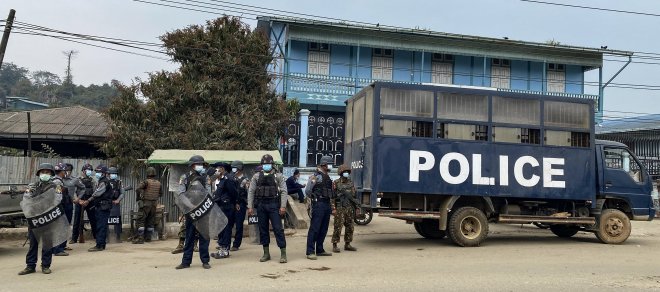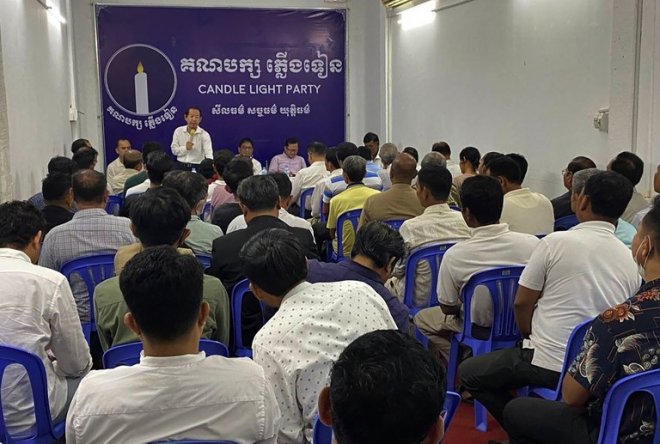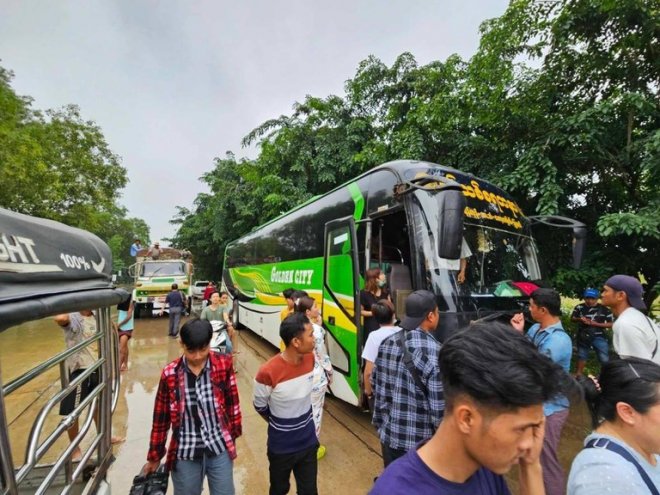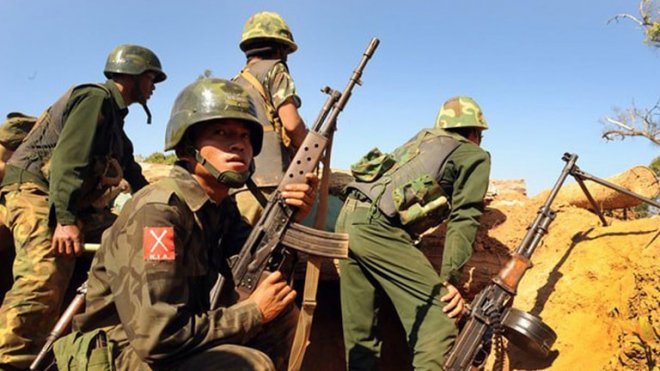In Myanmar jade town, junta arrests 700 to use some for human shields, residents say
As fierce fighting has enveloped a jade mining town in northern Myanmar, the military has arrested more than 700 civilians and used some of them as human shields in battles with rebel groups, residents told Radio Free Asia.So far this year, 20 people – mostly civilians – have been killed in the fighting in Kachin state’s Hpakant town, 711 miles north of Yangon.
The junta troops are trying to win back territory lost to People"s Defense Forces, made up of ordinary citizens who have taken up arms against the military, which took control of the country in a February 2021 coup d’etat.
The civilians were apparently arrested for supporting PDF or Kachin Independence Army, an armed ethnic group, and held in custody near junta camps. It isn’t clear if they have been formally charged. About 500 of them have been allowed to return to their homes, while about 100 remain detained.
“They were arrested to be used as hostages or human shields for the junta troops. Most of them, about 75%, were released later,” a Hpakant resident, who declined to be named, told RFA.
“Some of them were specifically arrested at home by junta forces that were acting as if they were carrying out a mission and were not released,” the resident said. “They were prosecuted and given prison sentences.”
No clear charges
In March, the junta arrested the owner of the Shu Daunt Thit tea shop in Hpakant, who was an officer in the Kachin Independence Organization, or KIO, the KIA’s political wing. They also arrested 30 civilians, including four that they found in the home of the KIO officer. Another 17 Hpakant civilians were arrested on May 2 and 3.
On April 21, nearly 200 residents of a single village in Hpakant Township were arrested for allegedly supporting the KIA and the PDF, and about 150 have not yet been released, according to a resident.
“They have released about 50 of them. Since they arrested about 200, 150 of them are still in their custody,” he said. “They do not cite any particular law for the arrests. They have detained them just by accusing them of supporting the KIA and the PDF.”
The villager said that those arrested were kept in the police jail in Ma Sut Yang village and Htwal Aung, one of the detainees, was killed when he was beaten during interrogation.
On April 18, the military council troops entered a different village and arrested more than 80 civilians to be used as human shields, said a resident who escaped.
“They arrested about 80 people. They made us walk in front of them, making us keep our heads down,” he said. “They asked us not to look at them. When we got to the motor road, the junta soldiers made us split into two groups and made us ride with them in two big trucks.”
 Myanmar military troops are seen in Hpakant in this undated photo. Credit: RFA
Myanmar military troops are seen in Hpakant in this undated photo. Credit: RFAMen were put in a truck in the front and women in the rear – which was hit by gunfire, he said.
“The truck in the front was not hit, only the one behind. Seven of the detained civilians were hit by the bullets and one of them died," he said.
The woman who died was 20-year-old Sai Mon Mai, while the six injured women were Bauk Mai, La Ban Kharn Shaung, In Khun Bauk Sant, Maran Sai Mai, Zar Zar Myo and La Bya Kharn Nan, he said.
“We have seen that the junta troops shoot, arrest and kill everyone on their way as a strategy to rule the country by putting fear in the people,” said a human rights activist in Kachin state who refused to be named for security reasons.
‘Failed state’
Kyee Myint, a justice lawyer, said Myanmar has become a “failed state” under the junta.
“There is no more law and order,” he said. “That’s why it is questionable as to who is really in charge. The junta has totally failed to uphold the rule of law.”
On April 23, 5 people, including several businessmen and a military junta major were shot and killed at a karaoke room in Hpakant’s Ma Shi ka Htuang ward. The next morning, the junta shot and killed a KIO member and a PDF member they had captured.
Locals said that unidentified bodies of people who had been killed are often seen in Hpakant.
Regarding these events, Win Ye Tun, Kachin State social affairs minister and spokesman for the junta, said that although he has heard the news, it is difficult for him to confirm because it is a security issue.
“We have heard of some of the cases but we can’t confirm the news from our department,” he said. “The security departments might have more news, but we are trying to help the government to be able to take action in accordance with the law.”
A Hpakant resident told RFA that she no longer felt safe living there.
“In the current situation, I have to be afraid of everything,” she said. “I dare not go out. I am facing life-threatening danger everywhere.”
Translated by Myo Min Aung. Edited by Eugene Whong and Malcolm Foster.
[圖擷取自網路,如有疑問請私訊]
|
本篇 |
不想錯過? 請追蹤FB專頁! |
| 喜歡這篇嗎?快分享吧! |
相關文章
AsianNewsCast






















